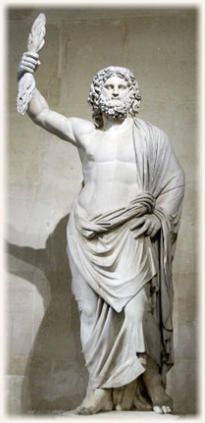“And
whoever
exalts
himself
shall
be
humbled;
and
whoever
humbles
himself shall be exalted” (Matthew 23:12).
Transcendence, Condescension, and
Exaltation
“[There
is]
a
legend
of
the
citizens
of
ancient
Greece
who
had
once
staged
a
competition
for
a
grand
new
statue
of
Jupiter.
One
of
the
two
finalists
was
‘a
figure
of
classical
beauty
—
the
perfection
of
symmetry
—
a
paragon
of
sculpture
—
a
miracle
of
art
—
an
image
in
which
glorious
life
had
been
arrested
at
its
highest
tide
—
a
fit
marble
ideal
of
the
presiding
divinity
in
the
assemblage
of
the
Gods!’
The
other
was
‘a
rough
effigy
of
a
human
figure
—
no
majesty
in
its
lineaments
—
no
grace
in
its
pose
—
apparently
no
art
in
its
execution
—
no
harmony
in
its
relations
—
no
dignity
in
its
bearing.’
Naturally,
the
audience
made
its
decision
promptly.
The
first
statue
was
‘our
Jupiter.’
The
second,
‘inglorious
statue,’ should be cast into the sea.
“But
a
poet
in
the
crowd
begged
for
a
re-evaluation.
Raise
both
statues
atop
their
tall
pedestals,
he
urged,
and
then
consider
the
images
anew.
A
few
days
later
an
‘eager
throng’
gathered
to
re-judge
the
competitors,
to
find
the
‘two
draped
figures
…
poised
in
mid-air.’
The
draperies
were
shaken
loose,
and
‘the
two
competitors
stood
out
in
bold
relief
against
the
pure
azure
sky.’
Miraculously
the
‘favorite
had
been
transformed
by
the
intervening
distance.
The
classical
features
—
the
sparkling
eye
—
the
luminous
countenance,
had
vanished:
but,
a
greater
transformation
had
been
wrought
in
the
other
figure
by
distance.
…
Life
had
been
impressed
upon
those
hitherto
ungainly
features
—
majesty
sat
enthroned
upon
those
rugged
lineaments
—
the
eyes
gleamed
with
the
fire
of
genius
…
and
a
God
stood
outlined
in
classical
marble,
to
the
view’”
(Harold
Holzer,
Fortenbaugh Memorial Lecture, Gettysburg College, 2004, pp. 50,51).
The
Bible
ascribes
a
paradoxical
pair
of
attributes
to
God.
He
is
both
transcendent
(Psa.
113:5)
and
immanent
(Deut.
4:7).
In
other
words,
He
is
both
distant
(Eccl.
5:2)
and
near
(Jas.
4:8).
That
distance
sets
God
apart,
over
and
above
all,
and
exalts
Him
in
unmatched
majesty.
His
character
is
untainted
by
contact
with
the
unholy,
yet
His
transcendence
does
not
keep
Him
from
condescending
to
those
who
draw
near
to
Him
in
obedience
(Heb.
7:25).
This
is
clearly
expressed
in
the
fact
that
God,
in
the
person
of
Christ,
though
high
and
exalted,
emptied
Himself
to
enter
the
flesh
of
a
man,
and
a
poor,
unattractive
man
at
that,
and
suffer
therein,
only
thereby
to
reverse
His
condition
and
be
restored to transcendent exaltation.
Isaiah
refers
to
this
cycle
of
transcendence,
condescension,
and
exaltation.
He
prophesies
that
“…
His
appearance
was
marred
more
than
any
man,
and
His
form
more
than
the
sons
of
men.
…
He
has
no
stately
form
or
majesty
that
we
should
look
upon
Him,
nor
appearance
that
we
should
be
attracted
to
Him”
(52:14;
53:2).
Yet,
because
He
suffered,
He
was
restored
to
exaltation.
“Behold,
My
servant
…
will
be
high
and
lifted
up, and greatly exalted” (52:13).
Likewise,
Paul
says
Christ
“emptied
Himself,
taking
the
form
of
a
bondservant,
and
…
humbled
Himself
by
becoming
obedient
to
the
point
of
death,
even
death
on
a
cross”
(Phil.
2:7,8).
By
condescending
in
this
way,
He
experienced
the
reversal
of
His
condition,
so
that
He
was
restored
to transcendence. “Therefore also God highly exalted Him …” (2:9).
This
process
may
be
replicated
in
sinners.
If
they
will
humble
themselves,
they
will
be
raised
to
“walk
in
newness
of
life”
(Rom.
6:4)
and
ultimately exalted to heaven (1 Cor. 15:42f).
Christ’s
enemies
could
not
see
past
His
offending
fleshly
condition
to
behold
His
divine
grandeur.
Only
when
one
lowers
himself
by
raising
Christ
to
view
Him
at
a
distance
is
His
fleshly
condition
obscured
so
that
He
may
be
revered
in
all
His
glory.
“…
Even
though
we
have
known
Christ
according to the flesh, yet now we know Him thus no longer” (2 Cor. 5:16).
Copyright © 2017 - current year, Gary P. and Leslie G. Eubanks. All Rights Reserved.
Jupiter image: Marie-Lan Nguyen - Own work, Public Domain,
https://commons.wikimedia.org/



Copyright © 2017 - current year, Gary P. and Leslie G. Eubanks. All Rights Reserved.
“And
whoever
exalts
himself
shall
be
humbled;
and
whoever
humbles
himself
shall
be exalted” (Matthew 23:12).
Transcendence,
Condescension, and
Exaltation
“[There
is]
a
legend
of
the
citizens
of
ancient
Greece
who
had
once
staged
a
competition
for
a
grand
new
statue
of
Jupiter.
One
of
the
two
finalists
was
‘a
figure
of
classical
beauty
—
the
perfection
of
symmetry
—
a
paragon
of
sculpture
—
a
miracle
of
art
—
an
image
in
which
glorious
life
had
been
arrested
at
its
highest
tide
—
a
fit
marble
ideal
of
the
presiding
divinity
in
the
assemblage
of
the
Gods!’
The
other
was
‘a
rough
effigy
of
a
human
figure
—
no
majesty
in
its
lineaments
—
no
grace
in
its
pose
—
apparently
no
art
in
its
execution
—
no
harmony
in
its
relations
—
no
dignity
in
its
bearing.’
Naturally,
the
audience
made
its
decision
promptly.
The
first
statue
was
‘our
Jupiter.’
The
second,
‘inglorious
statue,’ should be cast into the sea.
“But
a
poet
in
the
crowd
begged
for
a
re-evaluation.
Raise
both
statues
atop
their
tall
pedestals,
he
urged,
and
then
consider
the
images
anew.
A
few
days
later
an
‘eager
throng’
gathered
to
re-judge
the
competitors,
to
find
the
‘two
draped
figures
…
poised
in
mid-air.’
The
draperies
were
shaken
loose,
and
‘the
two
competitors
stood
out
in
bold
relief
against
the
pure
azure
sky.’
Miraculously
the
‘favorite
had
been
transformed
by
the
intervening
distance.
The
classical
features
—
the
sparkling
eye
—
the
luminous
countenance,
had
vanished:
but,
a
greater
transformation
had
been
wrought
in
the
other
figure
by
distance.
…
Life
had
been
impressed
upon
those
hitherto
ungainly
features
—
majesty
sat
enthroned
upon
those
rugged
lineaments
—
the
eyes
gleamed
with
the
fire
of
genius
…
and
a
God
stood
outlined
in
classical
marble,
to
the
view’”
(Harold
Holzer,
Fortenbaugh
Memorial
Lecture,
Gettysburg
College,
2004, pp. 50,51).
The
Bible
ascribes
a
paradoxical
pair
of
attributes
to
God.
He
is
both
transcendent
(Psa.
113:5)
and
immanent
(Deut.
4:7).
In
other
words,
He
is
both
distant
(Eccl.
5:2)
and
near
(Jas.
4:8).
That
distance
sets
God
apart,
over
and
above
all,
and
exalts
Him
in
unmatched
majesty.
His
character
is
untainted
by
contact
with
the
unholy,
yet
His
transcendence
does
not
keep
Him
from
condescending
to
those
who
draw
near
to
Him
in
obedience
(Heb. 7:25).
This
is
clearly
expressed
in
the
fact
that
God,
in
the
person
of
Christ,
though
high
and
exalted,
emptied
Himself
to
enter
the
flesh
of
a
man,
and
a
poor,
unattractive
man
at
that,
and
suffer
therein,
only
thereby
to
reverse
His
condition
and
be
restored to transcendent exaltation.
Isaiah
refers
to
this
cycle
of
transcendence,
condescension,
and
exaltation.
He
prophesies
that
“…
His
appearance
was
marred
more
than
any
man,
and
His
form
more
than
the
sons
of
men.
…
He
has
no
stately
form
or
majesty
that
we
should
look
upon
Him,
nor
appearance
that
we
should
be
attracted
to
Him”
(52:14;
53:2).
Yet,
because
He
suffered,
He
was
restored
to
exaltation.
“Behold,
My
servant
…
will
be
high
and
lifted up, and greatly exalted” (52:13).
Likewise,
Paul
says
Christ
“emptied
Himself,
taking
the
form
of
a
bondservant,
and
…
humbled
Himself
by
becoming
obedient
to
the
point
of
death,
even
death
on
a
cross”
(Phil.
2:7,8).
By
condescending
in
this
way,
He
experienced
the
reversal
of
His
condition,
so
that
He
was
restored
to
transcendence. “Therefore also God highly exalted Him …” (2:9).
This
process
may
be
replicated
in
sinners.
If
they
will
humble
themselves,
they
will
be
raised
to
“walk
in
newness
of
life”
(Rom.
6:4)
and
ultimately
exalted
to
heaven
(1
Cor.
15:42f).
Christ’s
enemies
could
not
see
past
His
offending
fleshly
condition
to
behold
His
divine
grandeur.
Only
when
one
lowers
Jupiter image: Marie-Lan Nguyen - Own work, Public Domain,
https://commons.wikimedia.org/














